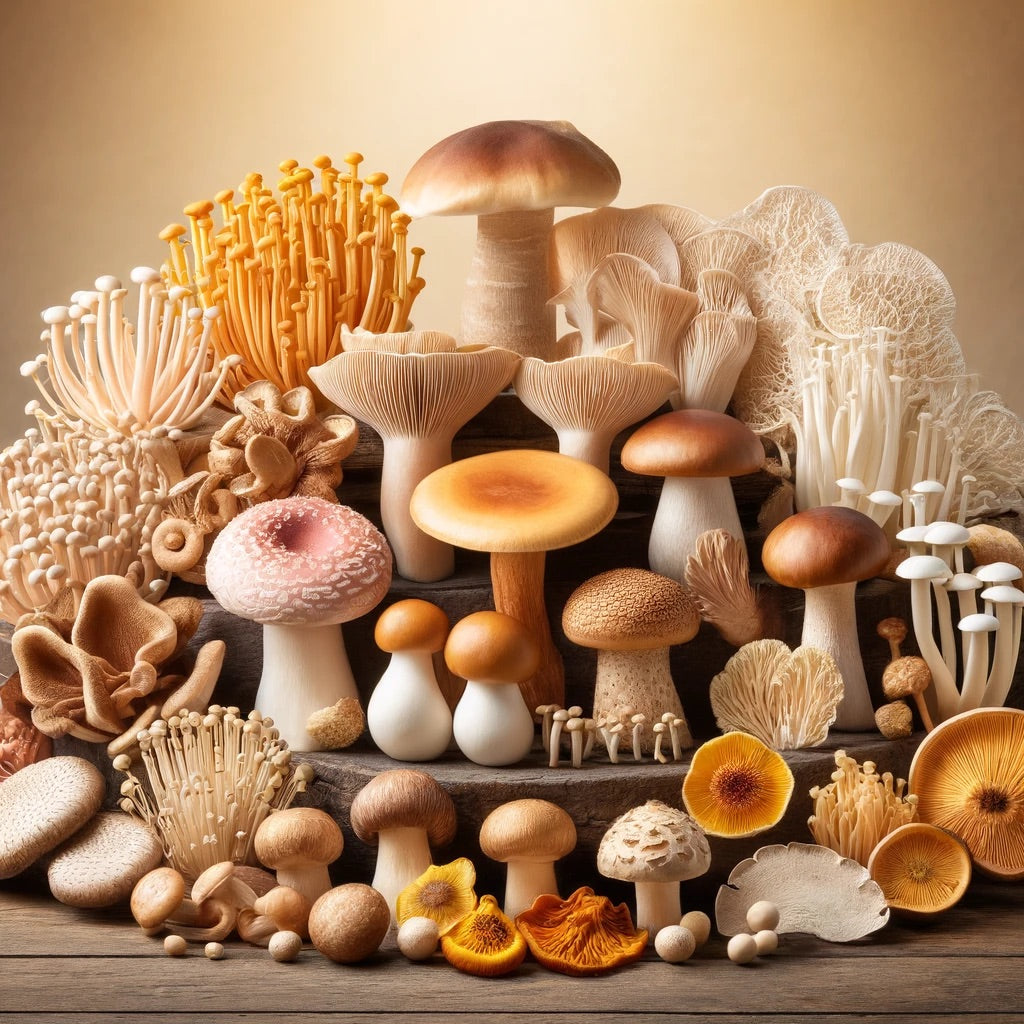
Unlocking the Health Secrets of Edible Mushrooms: Benefits and Uses
Share
Mushrooms have been a significant part of human diets and traditional medicine for thousands of years. Their unique ability to confer a wide range of health benefits, from boosting the immune system to potentially reducing the risk of serious illnesses, has garnered the attention of both the culinary and scientific communities worldwide. This article will explore the various types of edible mushrooms, each heralding its own set of health-promoting properties.
The kingdom of fungi presents us with a bounty of mushrooms, each distinct in shape, size, color, and nutrient profile. These remarkable organisms are not only prized for their versatile culinary uses but also for their therapeutic potentials, such as the immune magic for starters, but there is so much more. As we delve into the world of mushrooms, it's essential to recognize their role not just as food but as a bridge to better health.
Types of Edible Mushrooms and Their Benefits
1. Shiitake (Lentinula edodes)
Shiitake mushrooms are celebrated for their rich, umami flavor and impressive health benefits. Native to East Asia, these mushrooms support immune health thanks to their high content of polysaccharides, like lentinan, which may also have anti-cancer properties. They may also help improve heart health by lowering bad cholesterol levels. Shiitake are versatile in the kitchen, enhancing dishes ranging from stir-fries to soups with their deep, savory taste. You'll find shiitake mushrooms in our Tuscan White Bean Soup!
2. Reishi (Ganoderma lucidum)
Reishi, known as the "mushroom of immortality," is revered for its therapeutic benefits, including stress reduction, immune support, improved sleep, fatigue assistance and potential longevity-enhancing effects. While its woody texture makes it less than desireable for culinary uses, Reishi is widely consumed in teas, powders, and supplements for its health-promoting compounds.
3. Cordyceps (Cordyceps sinensis)
Cordyceps mushrooms have gained popularity for their energy-boosting and performance-enhancing benefits. Traditionally found growing on caterpillars in the wild, these mushrooms are now mostly cultivated. They are believed to improve exercise performance by enhancing oxygen utilization and aerobic capacity and may have anti-aging and health-promoting properties. They are mostly found in supplement form due to its rarity and unique growing conditions.
4. Portobello (Agaricus bisporus)
Portobello mushrooms are the mature form of Crimini mushrooms, known for their large, meaty caps. They are a great source of B vitamins (particularly niacin and riboflavin), minerals (like selenium, crucial for thyroid function and antioxidant defense), protein and fiber. Portobellos are particularly popular as a meat substitute in vegetarian dishes, offering a rich, earthy flavor that makes them ideal for grilling or roasting. Try a portobello mushroom burger!
5. Oyster (Pleurotus ostreatus)
Oyster mushrooms are distinguished by their delicate texture and mild, sweet taste. They offer several health benefits, including benefits for heart health due to their statin content assisting in lowering cholesterol, as well as antioxidant and anti-inflammatory properties. Oyster mushrooms are adaptable in many recipes, from stir-fries to baking.
6. Enoki (Flammulina velutipes)
Enoki mushrooms, with their long, slender stems and small caps, are a staple in East Asian cuisine. They are prized for their crunchy texture and mild, slightly sweet flavor. Enokis are rich in vitamins and minerals, and research suggests they may boost immune health and reduce the risk of certain diseases such as cancer. They are also low in calroies making them a great addition to a weight management diet. These are great in soups, salads, and stir-fries for their crunchy texture.
7. Morel (Morchella esculenta)
Morels are highly sought after by chefs and food enthusiasts for their unique, honeycomb appearance and nutty flavor. They are rich in antioxidants and vitamin D which is rare in edible plants, supporting immune and bone health. Morels are a springtime delicacy, perfect for sautéing and incorporating into sophisticated dishes.
8. Chanterelle (Cantharellus cibarius)
Chanterelles are renowned for their vibrant color and fruity, peppery taste. These mushrooms are a good source of vitamins C and D, potassium, as well as dietary fiber. They are best enjoyed fresh, adding a delicate, aromatic flavor to sauces, soups, and sautéed dishes.
9. Turkey Tail (Trametes versicolor)
Turkey Tail mushrooms are known for their striking, colorful fan shape and their medicinal properties. They contain polysaccharide-K (PSK), a compound used in cancer treatment in some countries. It also promotes gut health due to its high content of prebiotics. Turkey Tail is primarily used in supplement form or as a tea for its immune-boosting benefits.
10. Crimini (Agaricus bisporus)
Crimini mushrooms, also known as baby bellas, are the younger, browner version of the white button mushroom and the juvenile stage of the Portobello. They offer a slightly deeper flavor than their white counterparts and are packed with selenium, antioxidants, and B vitamins and support energy metabolism. They also offer phytonutrients that may bolster the immune system and reduce inflammation. With a deeper, earthier flavor than white button mushrooms, Criminis are versatile in cooking—perfect for sautéing, roasting, or adding to stews and sauces for a rich, umami depth. You can find Crimini mushroom in our French Lentil Soup.
Magical World of Mushrooms
The world of mushrooms offers a fascinating glimpse into the intersection of food and medicine. With each variety comes a unique set of nutrients and health benefits, from shiitake's cholesterol-lowering effects to turkey tail's potential in cancer therapy. Incorporating a diverse range of mushrooms into one's diet can contribute significantly to overall health and well-being.
However, it's important to note that while mushrooms can complement a healthy lifestyle, they are not a cure-all and should be part of a balanced diet. Moreover, some wild mushrooms can be toxic, so always source your fungi from reputable suppliers.
Mushrooms not only enrich our plates but also our health, providing a delicious and nutritious way to support our well-being. As research continues to unveil more about these fascinating fungi, we can only anticipate discovering even more benefits that these earthly treasures have to offer.
